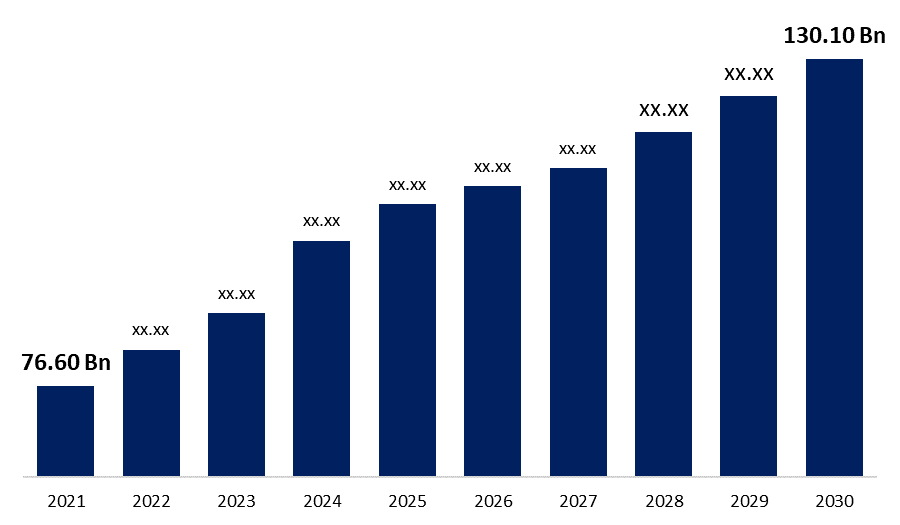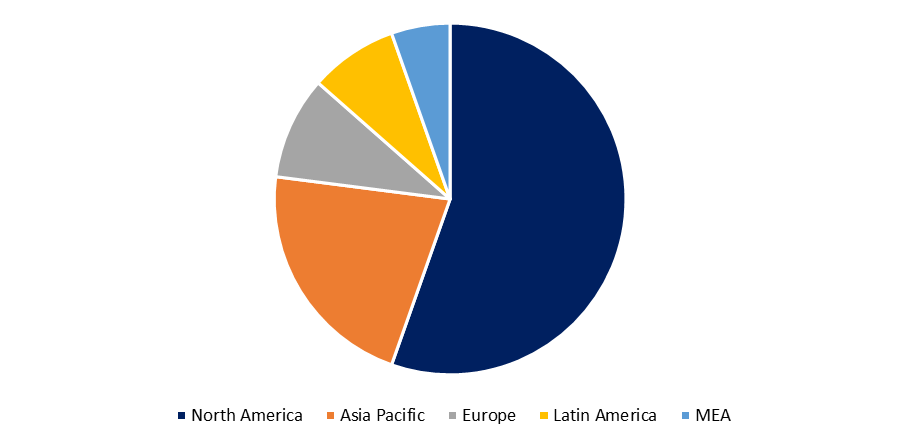Global Industrial Internet of Things Market Size, Share & Trends, COVID-19 Impact Analysis Report, By Component (Hardware, Software, and Services), By Vertical (Manufacturing, Energy & Power, Oil & Gas, Retail, Healthcare, Transportation, and Others), and By Region (North America, Europe, Asia-Pacific, Latin America, Middle East, and Africa), Analysis and Forecast 2021 – 2030
Industry: Information & TechnologyMARKET SUMMARY
The Global Industrial Internet of Things Market Size, is expected to be worth USD 76.60 Billion in 2021 and is estimated to reach up to USD 130.10 Billion by 2030, at a compound annual growth rate (CAGR) of 6.50% from 2021 to 2030. A few of the industrial IoT (IIoT) processes that are combined with the Internet of Things include automation, optimization, monitoring, maintenance, and networking. By focusing on machine-to-machine (M2M) connectivity, big data, and machine learning, the IIoT helps industries and businesses to increase their operational efficiency and dependability. The IIoT includes industrial applications like robotics, medical technology, and software-defined manufacturing procedures. With the aid of big data analytics and Industry 4.0, cyber-physical systems and production processes are expected to advance, and the IIoT is essential to this development. Real-time data from sensors and other sources is used by industrial infrastructure and equipment to make decisions, gain insights, and take specific actions.

Get more details on this report -
COVID-19 ANALYSIS
The COVID-19 outbreak has a negative effect on the market for industrial internet of things worldwide. As the pandemic spreads over growing Asian nations and North America, the industrial sector is facing significant challenges. The US auto sector, one of the biggest in the world, has been at a standstill since the third quarter of 2020. Numerous automakers have reduced the size of their production facilities throughout the area, making outdated technologies like IoT, AI, and Blockchain that they had previously deployed in their factories. The automotive industry in North America primarily benefits Mexico. However, due to the considerably decreased production of cars, the Mexican automotive industry has experienced significant losses.
MARKET TREND
Blockchain Technologies Prevalence in Different Verticals Propel Market Growth
The main driver driving this market is the widespread adoption of blockchain technology across various industries, which is expected to fuel the expansion of the worldwide industrial internet of things market. Devices that are connected to the internet generate enormous volumes of data and information that must be analyzed. On the other side, there are numerous security and privacy issues with the internet of things basic security gateway. For connected devices, the blockchain-based architecture allows simple, decentralized security solutions.
MARKET DRIVERS
Growing Rapidly Urbanization and Industrialization Drive Market Growth
Growing urbanization and industrialization, together with improved power generation capacity, are all propelling market expansion. Uninsulated conductor is in demand as urbanization and digitization increase across emerging nations. To manage large amounts of data, high performance gigabit processing speeds at low voltages are necessary. These elements are causing the industrial internet of things market to expand globally.
Growing Adoption of Industrial Internet of Things to Manufacture Mass Products Boost Market growth
The global market for the industrial internet of things is being driven by the emergence of the connected enterprise. Effective information interchange across various industry units is essential for increased production operations. Manufacturers can better understand the process of turning raw materials into finished goods with the help of IoT and IP networks. Field instrument tracking, ensuring proper raw material flow, monitoring inventory levels, and reporting goods as they move through the supply chain are all possible with IoT-enabled devices.
MARKET CHALLENGE
High Initial and Maintenance Cost of Industrial Internet of Things Hampering Market Growth
The initial and maintenance cost of industrial control and factory automation will restrain the growth of the worldwide industrial internet of things market during the forecast period. Industrial solutions are more expensive to produce and need more maintenance, which has led to price increases. Nevertheless, after making the initial capital investments, there is a need for maintaining and updating industrial control and factory automation systems and solutions. For industrial control and factory automation systems and solutions to be maintained and upgraded, significant capital reinvestments are needed. The need for significant upfront investments and ongoing maintenance expenditures, as a result, is constraining the growth of the industrial control and factory automation markets, which in turn is limiting the expansion of the global industrial internet of things industry.
Global Industrial Internet of Things Market Report Coverage
| Report Coverage | Details |
|---|---|
| Base Year: | 2021 |
| Market Size in 2021: | USD 76.60 Billion |
| Forecast Period: | 2021-2030 |
| Forecast Period CAGR 2021-2030 : | 6.50% |
| 2030 Value Projection: | USD 130.10 Billion |
| Historical Data for: | 2017-2020 |
| No. of Pages: | 215 |
| Tables, Charts & Figures: | 79 |
| Segments covered: | By Component, By Vertical, By Region, COVID-19 Impact Analysis |
| Companies covered:: | Schneider Electric, IBM Corporation, Cisco, Siemens, GE, Microsoft, Intel Corporation, Rockwell Automation, Inc., ABB, Texas Instruments Inc., Dassault Systèmes, Honeywell International Inc., Huawei Technology Co., Ltd., Others |
| Growth Drivers: | 1)Growing Rapidly Urbanization and Industrialization Drive Market Growth 2)Growing Adoption of Industrial Internet of Things to Manufacture Mass Products Boost Market growth |
| Pitfalls & Challenges: | 1)High Initial and Maintenance Cost of Industrial Internet of Things Hampering Market Growth |
Get more details on this report -
MARKET SEGMENTATION
The global Industrial Internet of Things Market is segmented by Component, Vertical, and Region. Based on the Component, the market is categorized into Hardware, Software, and Services. Based on Vertical, the market is categorized into Manufacturing, Energy & Power, Oil & Gas, Retail, Healthcare, Transportation, and Others. Based on the Region, the market is categorized into North America, Europe, Asia-Pacific, South America, Middle East and Africa.
Component Insight
Based on the component, the industrial internet of things market is categorized into hardware, software, and services. Due to the growing use of solutions by businesses in 2022, the software sector held the largest market share. Solution suppliers are emphasizing the introduction of cutting-edge information solutions for numerous industries and industrial verticals. To track real-time data and boost operational efficiency, they are also focusing on integrating sensors and other systems into crucial equipment. With the use of such technology, manufacturing firms should be able to automate their intricate production procedures while keeping efficient monitoring.
The services segment is predicted to develop significantly throughout the projection period owing to the considerable rise in connected devices that produce enormous volumes of data. IIoT applications now use centralized cloud services to control data flow and overall business processes. By offering real-time analytical tools and strategies for decentralizing network storage and transactions, edge computing will also revolutionize the sector.
MARKET SEGMENTATION: BY REGION
The Global Industrial Internet of Things Market is categorized into North America, Europe, Asia-Pacific, Latin America, the Middle East and Africa.
North America is anticipated to have the largest market share of the worldwide market for industrial internet of things due to the IIoT's early adopter and has developed into a hub for innovation. As a result of government initiatives to encourage the adoption of IIoT solutions throughout the nation, Canada has also experienced great growth. Technological advancements, rapid digitalization across the IoT industry's verticals, and rising integration of numerous linked smart devices have all influenced the IoT industry's expanding demand in the North America region. However, during the course of the projected period, Asia Pacific is expected to become the region with the quickest growth due to the popularity of advanced factory automation systems is rising across the area, especially in Japan, China, and Taiwan. Manufacturing businesses all around the region are starting to recognize the benefits of using robot arm technology. Thanks to government initiatives like "Made in China 2025," which priorities the development of cutting-edge automation technology in the area, China is on course to become a precision manufacturing hub by 2027. Parallel to this, a large number of venture capitalists in the area are funding IIoT-based businesses to improve industrial IoT technology. Pi Ventures invested USD $1 million in SwitchOn, an AI-driven IIoT platform created by The Abee Research Labs Pvt. Ltd. of India, in June 2019.

Get more details on this report -
COMPETETIVE ANALYSIS
- Schneider Electric
- IBM Corporation
- Cisco
- Siemens
- GE
- Microsoft
- Intel Corporation
- Rockwell Automation, Inc.
- ABB
- Texas Instruments Inc.
- Dassault Systèmes
- Honeywell International Inc.
- Huawei Technology Co., Ltd.
- Others
RECENT DEVELOPMENT
- In April 2021, Intel has teamed with John Deere in a significant move, providing AI technology to create an integrated, end-to-end system of hardware and software that can produce insights in real time at the edge, at levels beyond the capacity of human senses. while utilizing an inference engine built on a neural network.
- In February 2021, Cisco and Newark announced a partnership to offer customers in North America IIoT network solutions for challenging non-carpeted environments.
REPORT OVERVIEW
The scope of the report includes a detailed study of regional markets for Global Industrial Internet of Things Market. The global Industrial Internet of Things Market is segmented by Component, Vertical, and Region. It reveals the market situation and future forecast. The study also covers the significant data presented with the help of graphs and tables. The report covers information regarding the competitive outlook including the market share and company profiles of the key participants operating in the Global Industrial Internet of Things Market.
SEGMENTATION
By Component
- Hardware
- Software
- Services
By Vertical
- Manufacturing
- Energy & Power
- Oil & Gas
- Retail
- Healthcare
- Transportation
- Others
By Region
- North America- U.S., Mexico, Canada
- Europe- UK, France, Germany, Italy, Spain, Rest of Europe
- Asia-Pacific- China, Japan, India, South Korea, Rest of Asia Pacific
- South America- Brazil, Argentina, Colombia, Rest of South America
- The Middle East and Africa- GCC, South Africa, Rest of Middle East & Africa
Need help to buy this report?